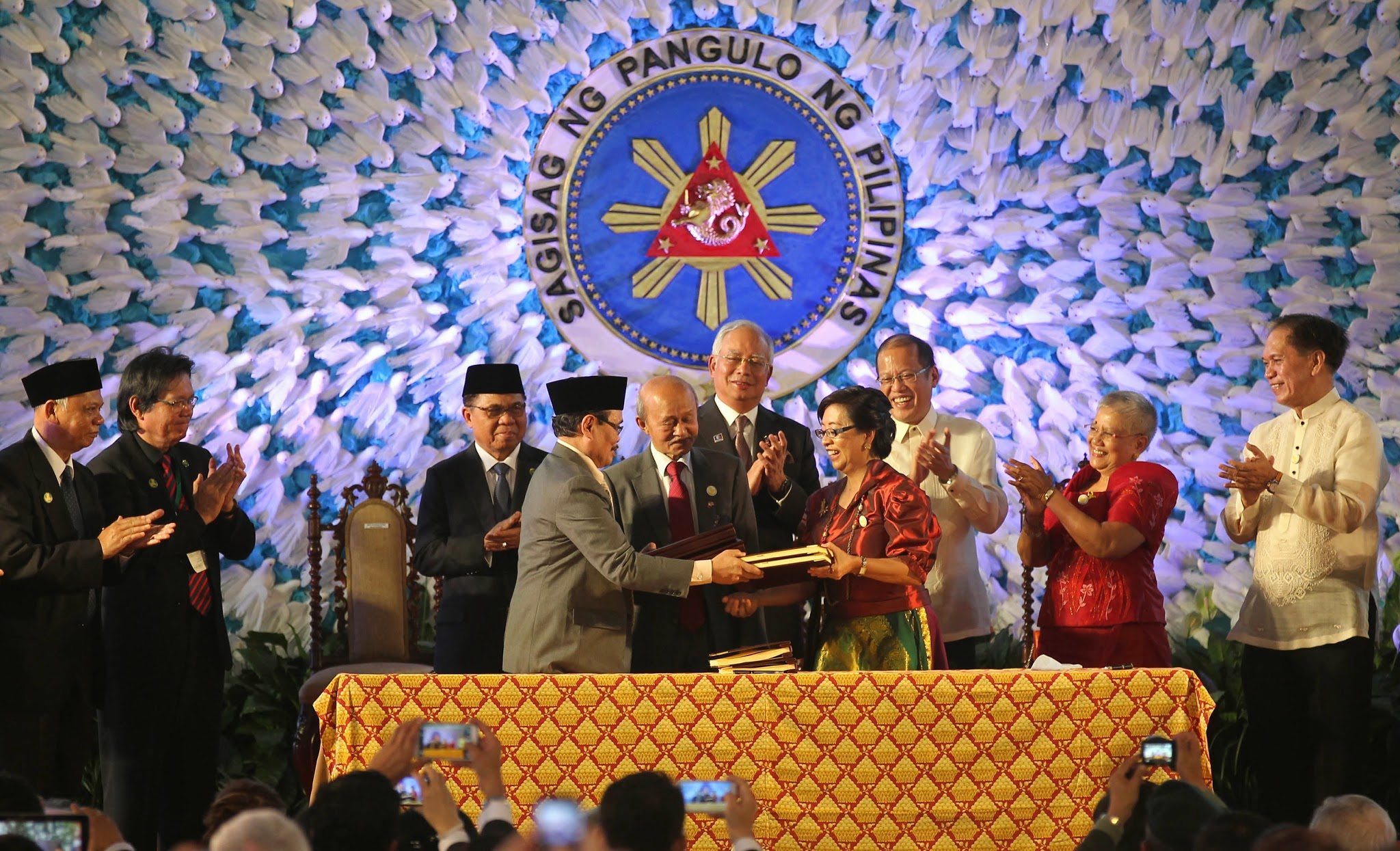Headline
Bangsamoro economy to grow by 12.8% under BBL

President Benigno S. Aquino III and Malaysian Prime Minister Najib Razak witness MILF Peace Panel chairman Mohagher Iqbal, GPH Peace Panel chairperson Professor Miriam Coronel-Ferrer and Malaysian facilitator Tengku Ghafar affix their signature to the Comprehensive Agreement on the Bangsamoro in a ceremony at the Kalayaan grounds of the Malacañan Palace on Thursday (March 27). Also in photo are MILF chairman Al Haj Murad Ebrahim and Presidential Adviser on the Peace Process Secretary Teresita Quintos-Deles. (Photo by Gil Nartea/ Robert Viñas/ Rodolfo Manabat/ Malacañang Photo Bureau)
MANILA — Despite claims there is no serious study on the impact of the passage of the proposed Bangsamoro Basic Law (BBL) to the business sector and the economy, a study by the government’s economic planning agency projects that the country’s economy would benefit immensely when the proposed Bangsamoro law is passed into law.
National Economic and Development Authority (NEDA) officials said the passage of the BBL will attract more business investors to the region and boost economic growth in the proposed Bangsamoro region by up to 12.8% annually, thus reducing the rate of poverty.
“There is a Bangsamoro Development Plan and the idea there is to anticipate (business interest),” NEDA Deputy Director General Emmanuel Esguerra said in a news report.
Esguerra said Congress’ passage of the Bangsamoro law would assure business investors’ stability in the country’s policy framework, particularly in handling the peace and order problem in the South due to the armed conflict.
In a speech during the 5th General Meeting of the Davao City Chamber of Commerce and Industry Inc., Senator Ferdinand Marcos Jr. stressed there was no serious study on the BBL’s impact on business and economy.
Contrary to the Marcos’ claim, however, NEDA Regional Office 11 Director Maria Lourdes D. Lim stated that if the BBL is passed and fully implemented within the year, the Bangsamoro economy is expected to grow by 12.8 percent next year based on increased business activities as projected in the Bangsamoro development strategy.
“The plan is expected to push the regional economy to achieve double-digit growth rates in the first five years of the creation of the Bangsamoro, with gross regional domestic product per capita rising to P38,000 to P40,000, from the current P29,608. This will further narrow the regional disparities between the Bangsamoro and the rest of Mindanao regions,” Lim said in a DevPlus publication released by the NEDA for the first quarter.
Lim said this kind of growth rate will reduce the poverty incidence rate in the Bangsamoro to anywhere from 50 to 52 percent by 2016.
Showing their confidence in the Bangsamoro’s impact on Mindanao’s economy, business leaders have pledged to invest in businesses totaling USD 366 million or PhP 16.3 billion for Mindanao once the Bangsamoro law is passed.
“Although this legislation will not cure all the ills of the present situation, I believe the negotiators on both side sincerely tried their best to find a fair and lasting peace in Mindanao.” said Vicente T. Lao, chairman of the Mindanao Business Council (MinBC).
He also expressed his concern it is unfair for the peace negotiating panels of the Philippine Government (GPH) and the Moro Islamic Liberation Front (MILF) to say that the BBL was not extensively studied and that the draft law was not thoroughly discussed and analyzed.
Unifruitti Group of Companies Chairman John Perrine said that the initial investments in agricultural products vowed by different companies would generate around 23,000 jobs in direct employment in the Bangsamoro region. (PNA)





















